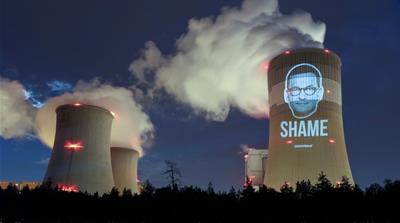‘Uncompetitive economics’: Coal heads for the exits in Europe
Renewable energy has now overtaken fossil fuels as Europe’s main source of energy, a new report shows.

Europe’s long goodbye to coal is speeding up, in a transition smoothed by the rise of wind and solar power and energy policy that has priced the fossil fuel out of many markets, according to data released on Wednesday.
Centuries after powering Europe’s industrial revolution, coal cannot compete with less polluting fuels to generate electricity, prompting governments and companies to close mines and plants.
Keep reading
list of 4 itemsWhat’s slowing down America’s clean energy transition? It’s not the cost
Global coal use to reach record high in 2023, energy agency says
COP28 Dubai is over: Four key highlights from the UN climate summit
Renewable sources of power have taken over for the first time in 2020, generating 40 percent of European Union electricity, while fossil fuels generated 34 percent, independent think-tank Ember said in a half-yearly report.
In Spain, coal generation fell 58 percent in the first six months of the year, even before half its remaining plants closed in June as they no longer complied with EU emissions rules.
Ember’s findings were reinforced by Global Energy Monitor researchers, who predicted a record rate of closures globally in 2020.
The pace of plant closures in Spain, with 69 percent of the entire fleet to be shuttered between 2020 and 2021, has no precedent, Global Energy Monitor Programme Director Christine Shearer said.
“The fact that such a rapid decline has taken place indicates the increasingly uncompetitive economics of coal power,” Shearer said.
The coronavirus outbreak depressed demand for power, further reducing coal consumption, the analysts said.
In Portugal, coal generation fell 95 percent in the first half of 2020, Ember said. Last week major utility EDP brought forward its Iberian plant closures to 2021, after reducing their value on its balance sheet last year.
The Netherlands, Austria and France all saw reductions of more than 50 percent. Sweden and Austria closed their last plants in March.
A source of tension
In Germany, coal-fuelled generation fell 39 percent, taking it for the first time below Poland, which now generates as much electricity from coal as the EU’s remaining 25 countries put together.

All five EU countries with no clear closure plan for their plants are in central and Eastern Europe, consultancy Energy Aspects said in a separate report this month, predicting Poland’s coal reliance will cause tension in the bloc.
Meanwhile, former US Vice President Al Gore said he is encouraged by the fact that so many economic stimulus plans across the globe are focused on carbon reduction. Speaking at a virtual event organised by the Bloomberg news agency, he said it shows that the world has crossed a threshold “beyond which it is ever clearer that sustainable technologies are cheaper and better”.
Also speaking at the Bloomberg Green event was famed climate economist Nicholas Stern who said the coronavirus pandemic has created new political momentum for climate policies across the globe.
Stern, who chairs London School of Economics’ Grantham Research Institute on Climate Change also said: “If you look at the opinion polls … they show that people want to build back better. They recognise the old system was dangerous and they recognise that we can change quickly. The political leaders not only have the space to do it, they have the pressure to do it.”